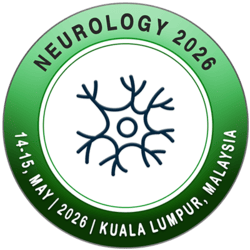
Aleem Ahmed Khan
Owaisi Hospital and Research Centre, IndiaPresentation Title:
Dynamin-related protein 1 expression as a non-invasive biomarker for mitochondrial dysfunction in Parkinson’s disease
Abstract
Background: Parkinson's disease (PD) is a progressive neurodegenerative disorder characterized by dopaminergic neuron loss. Mitochondrial dysfunction through excessive fission, impaired fusion, defective mitophagy, and oxidative stress plays a central role in PD pathogenesis. However, the exact relationship between mitochondrial dysfunction and PD progression remains poorly defined. Dynamin-related protein 1 (Drp1), a master regulator of mitochondrial fission, is implicated in neurodegeneration. This study assessed whether peripheral blood Drp1 expression reflects mitochondrial dysfunction in PD and may serve as a non-invasive biomarker.
Materials and methods: Drp1 gene expression was analyzed by RT-qPCR in peripheral blood samples from 25 PD patients and 25 age- and sex-matched healthy controls.
Results: Drp1 expression was significantly upregulated in PD patients, indicating heightened mitochondrial fission reflects mitochondrial dysfunction. Receiver operating Characteristic curve analysis revealed an area under the curve (AUC) of 0.94, indicating diagnostic potential. Stratified analysis showed that patients aged ≥60 years had significantly higher Drp1 levels than younger patients, with a stratified AUC of 0.89. No significant sex-based differences of DRP1 were observed.
Conclusion: The findings highlighted the role of mitochondrial dysfunction in PD and suggest that peripheral Drp1 expression may offer diagnostic value, particularly when stratified by age. Targeting excessive mitochondrial fission pathways may enable precision therapies to mitigate neurodegeneration. This study contributes to the understanding of PD molecular mechanisms and underscores the potential of DRP1 as a non-invasive tool to advance early diagnosis and precision medicine.
Biography
Aleem Ahmed Khan completed his PhD in Biotechnology and currently serves as Head of the Department at Deccan College of Medical Sciences, Owaisi Hospital and Research Centre, Hyderabad, India. He has published over 300 research articles in reputed international journals with more than 10,219 citations, an h-index of 41, and an i10-index of 165. He has authored 20 book chapters and holds 7 patents. His research spans neuroscience, molecular biology, mitochondrial dysfunction, stem cells, drug discovery, genetics, omics, liver cirrhosis, and ulcerative colitis. His pioneering work includes the development of Neo-artificial functional humanized liver organs for liver failure patients, Neo-pancreatic β-cell organs for diabetes treatment, nanoparticle-based stem cell tracking and delivery, and 3D culture model systems for cancer drug resistance. He has also advanced translational approaches such as trans-differentiated β-cell transplantation in diabetes and model systems for studying regeneration in alcohol-induced damage. He is an active reviewer and editorial board member for several high-impact journals. His innovative contributions in stem cell research, regenerative medicine, nanotechnology, and Bioartificial organ development have significantly advanced understanding and therapeutic strategies for neurodegenerative diseases, metabolic disorders, and cancer.


